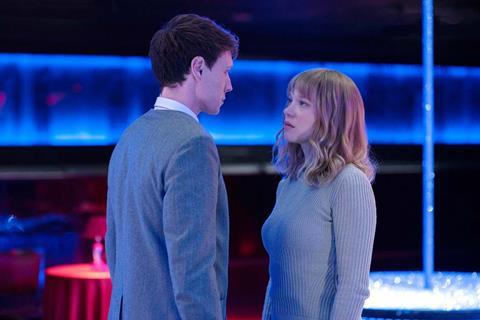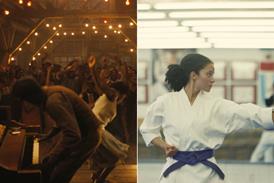Betrand Bonello’s adaptation of the Henry James novella is a retro/futurist drama starring Léa Seydoux and George MacKay

Dir. Bertrand Bonello. France/Canada. 2023. 145mins
Fears that French cinema has lost its bolder edge may be quelled by one curious fact: this year, France has produced not one but two experimental quasi-adaptations of the same Henry James story. The 1903 novella ’The Beast In The Jungle’ has inspired, first, the film of the same name by Patric Chiha, was reimagined for the late 20th-century Parisian nightlife scene, and now Bertrand Bonello’s retro/futurist hybrid The Beast, which, if anything, is even more outré in staging its collision between thriller, dystopian futurism and elegantly mounted heritage cinema.
An uncompromising exploration
In keeping with the ever-questioning approach of one of France’s most intelligently provocative auteurs, The Beast keeps us puzzling over the figure in the carpet – to cite another James story – but will hook cerebrally receptive audiences with its daring mix of genre elements and hot-button themes (AI, incel culture, the state of the soul in the digital age). Needless to say, the alluring duo of Léa Seydoux and George MacKay will boost the appeal of an uncompromising exploration.
James’s story, with its refined psychological ironies, concerns a relationship between two people – a woman and the man who takes her into his confidence, telling her that his entire life is heading towards a fated epiphany which remains elusive until it is too late. With dialogue in French and English, Bonello’s film adds a gender reversal: here it is the woman (Seydoux) who is waiting for her destiny to pounce on her, beast-like. But another beast apparently lurks in this story; the shadow of death – as suggested by a prelude in which Seydoux, as a present-day actress, is filmed performing a greenscreen shot that culminates in a storm of pixel disintegration.
The action then abruptly jumps to the early 20th century and a Paris soirée where married socialite Gabrielle (Seydoux) encounters Louis (MacKay), an Englishman she has met before, and to whom she has confided her apprehensions of a looming moment of truth. The pair draw closer, their destinies inextricably connecting during a devastating flood (a catastrophe that actually engulfed Paris in 1910). This makes for an extraordinary episode of heightened drama, a startling contrast with the introspective poise of what has gone before, and an arresting anomaly in the work of a director you do not normally associate with sequences of spectacular jeopardy.
Meanwhile, at some point in humanity’s near future – and, given the way the parallel-life strands are interwoven, ‘meanwhile’ somehow seems the appropriate term – society’s ills have been solved by AI, with human emotions considered a correctable flaw. In this best of all Huxley-esque worlds, the future Gabrielle undergoes a process to explore her past lives. One of these is situated in 2014 Los Angeles, where she is a French actress struggling to get a foothold in Hollywood while housesitting a luxurious residence for a very unempathetic owner. This section of the film explores some classic European-alone-in-L.A. devices, to droll effect: in a nightclub, Gabrielle is shunned by some lofty local girls for not being glamorous enough (this is Léa Seydoux we’re talking about, after all). In addition, she is stalked by a young Californian (MacKay again) who, in direct address to iPhone camera, delivers a textbook exposition of the embittered, misogynistic grievances of incel culture.
Each of the film’s three strands has its own dramatic flaws and virtues. But what is most intriguing is the way that the stories are braided, both in editor Anita Roth’s intercutting and in the establishing of visual parallels (the L.A. nightclub has its double in a future disco that specialises in retro pop nights, with an additional eerie echo of The Shining).
The Beast may seem at moments to be too pointedly invoking certain key contemporary issues as prompts to discussion, but Bonello has always been attuned to pricklier areas of the socio-philosophical zeitgeist; as in 2016’s Nocturama, which conflated terrorism with hip consumerism. The Beast similarly picks up themes from his last film Coma, a fiction-cum-essay on contemporary youth and the digital self – notably, in a mock-horror thread involving Gabrielle’s contact with an online medium (Elina Löwensohn).
The elegance of Josée Deshaies’s photography and Katia Wyszkop’s design provide a hyper-polished vitrine for the film’s intellectual content. The lead duo elegantly ring changes on their characters’ different selves, with Seydoux’s imperious fin de siècle confidence contrasting with her nervous isolation as an outsider in LA, and MacKay smoothly fitting the period salon milieu, then crackling with compressed angst as Louis’s volatile 21st-century avatar. Also distinctive is a silky cameo by Guslagie Malanda – such an imposingly enigmatic presence in Alice Diop’s Saint Omer – as the humanoid companion-lover of Gabrielle’s future.
Production companies: Les Films du Bélier, My New Picture, Sons of Manual
International sales: Kinology contact@kinology.eu
Producers: Justin Taurand, Bertrand Bonello, Nancy Grant, Xavier Dolan
Screenplay: Bertrand Bonello, Guillaume Bréault, Benjamin Charbit, from the short story by Henry James
Cinematography: Josee Deshaies
Editor: Anita Roch
Production design: Katia Wyszkop
Music: Bertrand Bonello, Anna Bonello
Main cast: Léa Seydoux, George MacKay, Guslagie Malanda, Elina Löwensohn























